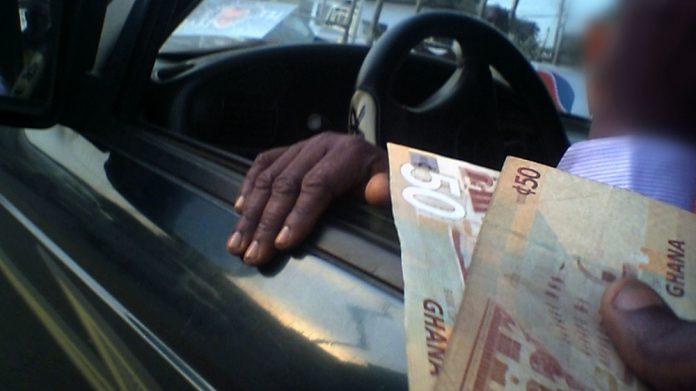A whopping amount of GH¢17.4 million went into individual pockets as bribes in 2021, as the government battles corruption and corruption-related activities in Ghana, a survey by the Ghana Statistical Service (GSS) has revealed.
The frequency with which bribes are paid was another important dimension of public sector corruption, according to the survey.
It indicated that bribe payers paid an average of five payers in the 12 months prior to the survey, resulting in an average of 0.98 bribes paid in 2021.
“That meant more than 17.4 million bribes were paid in the country, showing the magnitude of administrative corruption in the country,” the survey explained.
The report also indicated that the Ghana Police Service topped the institutions that took bribes, recording the largest share of 53.2%.
The law enforcement agency sat at the summit of the most corrupt institution among 23 others sampled in the country.
The Ghana Immigration Service officers and GRA customs officers followed next with 37.4% and 33.6%, respectively.
Elected government representatives, on the other hand, were at the bottom with 2.9%.
The survey also revealed that Ghana lost approximately GH¢5 billion in cash through the payment of bribes to public officials in 2021.
The latest findings were discovered in a survey conducted by the GSS together with other stakeholders dubbed ‘Corruption in Ghana, Peoples Experiences and View’.
The survey aims to unearth corrupt institutions and make available data that will guide the formulation of policies that will deal with corruption.
The key findings again showed that people with the highest level of (tertiary) education were 1.6 times more likely to have paid a bribe than people with no formal education.
Also, 10 out of the 16 administrative regions recorded a prevalence of bribery higher than the national average.
There are, however, sizable variations across the 16 regions of the country.
The prevalence of bribery in the Bono East, Savannah and Volta regions, for example, is substantially lower than the national rate, at 11.8, 14.5 and 19.1 per cent, respectively.
Also, in the Western North, Ahafo and North East regions, bribery is substantially higher, at 53.4, 47.0 and 41.9 per cent, respectively.
Corruption within the police administration is not a new subject of interest. High-ranking officials within the service have, over the years, been caught in compromising situations.
In 2019, for instance, a survey by the Global Corruption Barometer said Ghanaians still believe the police service is the most corrupt institution in Ghana.
Recently, the police came under heavy scrutiny after some of its officers were fingered in the recent bullion van robberies in Accra and other shady dealings.
The current administration is headed by Dr. George Akuffo Dampare, who has vowed to change the current narrative. He was appointed by President Akufo-Addo on Wednesday, 21 July 2021.
What is the way forward?
President Nana Addo Dankwa Akufo-Addo, on the assumption of office, promised to deal drastically with the corruption canker in the country.
The president said his government had invested more resources in the state’s anti-corruption agencies than any other administration in the country’s history and would ensure that those investments did not come to naught.
He said it was a matter of record that his administration, since 2017, had increased resource allocations to anti-corruption institutions such as parliament, the judiciary, police, EOCO, CHRAJ, and the Special Prosecutor’s office, among others.
“It is unfortunate that the perception is that the commitment of government is waning, especially when two or three facts are taken into account.”
“I don’t think that any government has mobilised resources to give the opportunity for anti-corruption agencies of the state to function as efficiently as this government has done. It is a matter of record,” he stressed.
A Ghanaian educationist and economist, Professor Stephen Adei, in an earlier public forum, encouraged the use of practical approaches to close loopholes and limit the chances of corruption.
“We have to reduce the opportunities for corruption. Let me give you an example. We implemented Integrated Customs Management Systems (ICUMS) at the ports, and both the NDC and NPP, as well as others, were opposing it. So, we introduced it in June 2020 – and from that day, we started getting an extra GH¢300million a month.
“The explanation for this is that the chances of corruption have considerably decreased. It is so painful and worrying that people would prefer to get GH¢10billion for Ghana to lose GH¢100billion.
“When I was young, I did some statistics, and it required 52 steps to clear a good in Tema Habour. When I went to Namibia, it required only three steps; so when the leader is not corrupt but is prepared to deal with party cronies, then we can put in systems to block those loopholes,” he said.
Professor Adei feels that the laws against corruption should be modified since they are not helping the country cope with the problem in its current shape.
“The other alternative is that if you are found in an act of corruption, you should be prosecuted quickly and effectively. A minor adjustment in the legislation is all that is required, but our parliamentarians do not want to amend the law because they are potentially corrupt.
“We are following the British system whereby you are not guilty unless proven, but in corruption, the giver and the receiver under our law are both criminals, so how can we catch them?
“If you extort money from me and I go and tell, I am a criminal, and you are a criminal. In Singapore, you have to prove the source of your wealth, but our people will not do it. Why? Because, consistently, the Executives and Parliamentarians are the most corrupt, followed by the police and the judiciary,” he said.
Below is the full document



